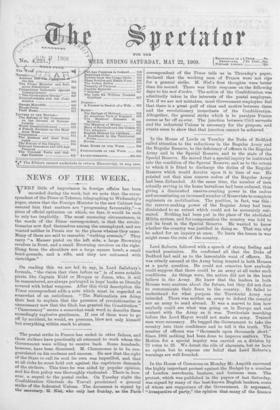The postal strike in France has ended in utter failure,
and those strikers have practically all returned to work whom the Government were willing to receive back. Some hundreds, however, have been dismissed. M. Clemenceau is to be con- gratulated on his coolness and success. He saw that the right of the State to call its soul its own was imperilled, and that at all risks he must hold out against the capricious demands of the strikers. This time he was aided by popular opinion, and his firm policy was thoroughly vindicated. There is, how- ever, a sequel to the postal strike. On Tuesday night the Confederation Generale du Travail proclaimed a general strike of the federated Unions. The document is signed by the secretary, M. Niel, who only last Sunday, as the Paris correspondent of the Times tells us in Thursday's paper, declared that the working men of France were not ripe for a general strike. M. Niels first thoughts were better than his second. There was little response on the following days to his mot d'ordre. The action of tho Confederation was admittedly taken in the interests of the postal employees. Yet, if we are not mistaken, most Government employees feel that there is a great gulf of class and motive between them and the revolutionary iconoclasts of the Confederation. Altogether, the general strike which is to paralyse France seems as far off as ever. The junction between Civil servants and the industrial Unions is necessary for the purpose, and events seem to show that that junction cannot be achieved.










































